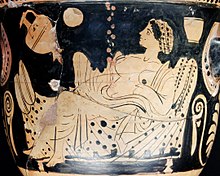InGreek mythology,Danaë(/ˈdæneɪ.i/,[1]/ˈdæni.iː/;[2]Ancient Greek:Δανάη,romanized:Danáē;Ancient Greek:[da.ná.ɛː],Modern:[ðaˈna.i]) was anArgiveprincess and mother of the heroPerseusbyZeus.She was credited with founding the city ofArdeainLatiumduring theBronze Age.
| Danaë | |
|---|---|
 AncientBoeotianbell-kratershowingZeusimpregnating Danaë in the form of a shower of gold, circa 450–425 BC | |
| Genealogy | |
| Parents | AcrisiusandEurydice |
| Children | Perseus |

Family
editDanae was the daughter and only child of KingAcrisiusofArgosby his wife QueenEurydice[3]orAganippe.[4]In some accounts, she had a sister,Evarete,wife of KingOenomausofPisaand mother ofHippodamia.[5]
Mythology
editDisappointed by his lack of male heirs, King Acrisius asked theoracleof Delphi if this would change. The oracle announced to him that he would never have a son, but his daughter would, and that he would be killed by his daughter's son. At the time, Danaë was childless and, meaning to keep her so, King Acrisius shut her up in a bronze chamber to be constructed under the court of his palace (other versions say she was imprisoned in a tall brass tower with a single richly adorned chamber, but with no doors or windows, just a small air vent as the source of light and air). She was buried in this tomb, with the intent that she be closed off from all others for the rest of her life. However, Zeus, the king of the gods, desired her, and came to her in the form of golden rain which streamed in through the roof of the subterranean chamber and down into her womb. Soon after, their childPerseuswas born.
Unwilling to provoke the wrath of the gods or theFuriesby killing his offspring and grandchild, King Acrisius cast Danaë and Perseus into the sea in a wooden chest. The sea was calmed byPoseidonand, at the request of Zeus, the pair survived. They were washed ashore on the island ofSeriphos,where they were taken in by the fishermanDictys—the brother of KingPolydectes—who raised Perseus to manhood in the temple of Athena. The King was charmed by Danaë, but she had no interest in him. Consequently, he agreed not to marry her only if her son would bring him the head of theGorgonMedusa.UsingAthena's shield,Hermes's winged sandals andHades's helmet of invisibility, Perseus was able to evade Medusa's gaze and decapitate her.
Later, after Perseus brought back Medusa's head and rescuedAndromedathe princess ofAethiopia,the oracle's prophecy came true. He started for Argos, but learning of the prophecy, instead went toLarissa,where athletic games,Olympics,were being held. By chance, an aging Acrisius was there and Perseus accidentally struck him on the head with hisjavelin(ordiscus), fulfilling the prophecy.
Genealogy
editGallery
edit- Danaë in art
-
Jan Gossaert,1527
-
One of several variantsbyTitian,1544.Cupidis alongside Danaë. 120 cm × 172 cm.National Museum of Capodimonte,Naples
-
Hendrick Goltzius,1603
-
Artemisia Gentileschi,c. 1612
-
Danaëby Orazio Gentileschi, 1621–23.
-
Danaë receivingJupiterin a Shower of Gold,byAdolf Ulrik Wertmüller(1787)
-
Jacob van Loo,1650s
-
Gustav Klimt'sDanaë,1907.
Citations
edit- ^Jones, Daniel; Roach, Peter, James Hartman and Jane Setter, eds.Cambridge English Pronouncing Dictionary.17th edition. Cambridge UP, 2006.
- ^Wells, John C. (2000) [1990].Longman Pronunciation Dictionary(new ed.). Harlow, England: Longman. p. 199.ISBN978-0-582-36467-7.
- ^Apollodorus,2.2.2.
- ^Hyginus,Fabulae63;ScholiastonApollonius of Rhodes,Argonautica4.1091.
- ^Hyginus,Fabulae84.
General and cited references
edit- Gaius Julius Hyginus,Fabulae from The Myths of Hyginustranslated and edited by Mary Grant. University of Kansas Publications in Humanistic Studies.Online version at the Topos Text Project.
- Apollodorus,The Librarywith an English Translation by Sir James George Frazer, F.B.A., F.R.S. in 2 Volumes, Cambridge, MA, Harvard University Press; London, William Heinemann Ltd. 1921.Online version at the Perseus Digital Library.Greek text available from the same website.
- Smith, William;Dictionary of Greek and Roman Biography and Mythology,London (1873)."Danae",Acri'sius